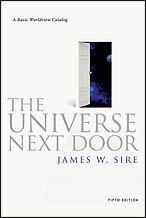Sire's book, The Universe Next Door, is an overview of the major worldviews, each dealt with in a separate chapter. The first chapter defines what a worldview is, then outlines seven basic questions whose answers will tell us what worldview a person holds. The second chapter describes the Christian theistic worldview. The following chapters tackle the conflicting worldviews of deism, naturalism, nihilism, existentialism, Eastern pantheistic monism, and new age. (A chapter on Islam has been added to the fifth edition.)
Sire presents an orthodox Christian view, although staunch Calvinists might feel that he strays from their philosophy. Sire notes, "While it is not the purpose of this description of theism to take sides in a famous family squabble within Christian theism (predestination vs. free will), we must note that Christians disagree on precisely what role God takes and what role he leaves us. Still, most would agree that God is the primary agent in salvation" (p 38).
While Sire delves rather deeply into philosophy and logic, he uses a multitude of examples and life applications. He quotes frequently from literature and philosophy, actually teaching us much about a number of major philosophers along the way. He makes no attempt to be nonjudgmental, but clearly shows where each of the non-Christian worldviews either fails to provide answers or contradicts itself.
[Note for those who have already studied worldviews: While various authors often use different classifications in describing worldview categories, Sire uses a few differentiations that I found very interesting: he subdivides existentialism into either atheistic or theistic existentialism, and he separates Eastern pantheistic monism from new age beliefs because of the latter's emphasis upon the value of the individual unlike the Eastern pantheist's idea of losing one's individual consciousness.]
This is heavy reading, appropriate for mature, motivated teens and for parents.










